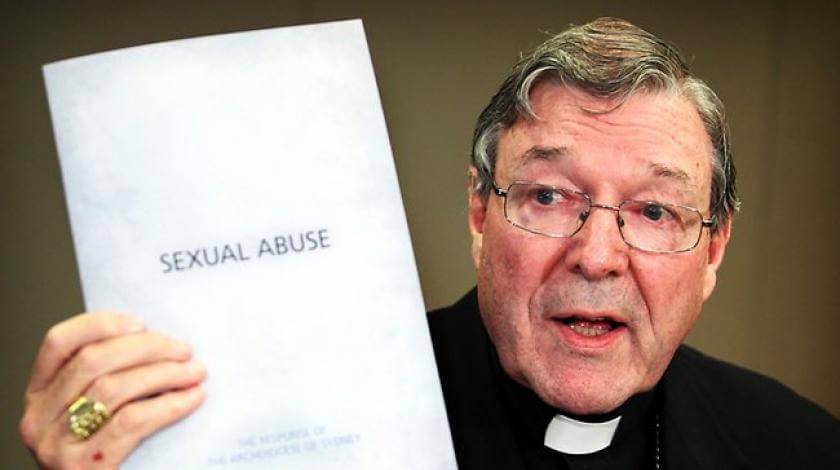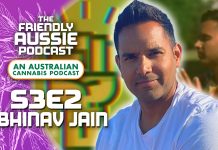Table of Contents
Welcome to the ‘Great Southern Land’; where sexual abusers of innocent children routinely face similar prison sentences to non-violent drug offenders.
The recent high-profile conviction of Cardinal George Pell – one of Australia’s most publicly known sex offenders, who also happened to be Australia’s most senior Catholic – has raised serious questions concerning the overall efficacy of our justice system. [1]
Earlier this month, Pell was sentenced to six years’ jail time on five counts of historical child sex abuse. [1] Some of the most serious charges were thrown out of court. Additionally, Pell received less time behind bars on account of having no previous conviction history for the sexual abuse of children. This is despite his history of being in and out of court trials for other ‘incidents’ involving just that; but in a court case from 2002, he had previously been exonerated by the Judge. Pell will be able to apply for parole after a period of three years and eight months in prison. [1]

Many Australians are celebrating that this tyrant has finally come to face the consequences of his actions, after having fled to the Vatican in 2016. Yet, many have also been left to openly wonder if this sentence is too short for a world-renowned child-fiddler. Much of that sentiment can be attributed to the way in which Pell’s case does not stand alone in its relatively lenient sentencing, nor in the widespread abuse of children by corrupt old men. This couldn’t be more true for the Catholic church, an institution world-famous for the abusive and exploitative behaviour it has managed to display over the centuries.
Prison Sentences Down Under
Our government is very much complicit in this state of affairs. To put it lightly, Australia’s justice system is historically known for its relative leniency when it comes to child abusers. Of course, Australia is technically a federation of states. As such, in a state law court, both Federal and State laws apply in any verdict.
The sentences handed down from state to state vary quite significantly. We won’t go too far into the weeds with comparing specific cases. Depending on where you live, though, it’s actually possible to receive more time in prison than a literal sexual abuser, simply for trafficking or supplying drugs. In fact, drug trafficking in Australia is deemed a very serious offence; legislators and courts have ruled that ‘general deterrence’ is paramount and ‘little mercy’ should be shown.
In most states, child abuse may be charged as either a felony or a ‘less serious’ offence, depending on the circumstances. In a large number of cases, sentencing can include probation or a prison term of up to five years. Admittedly, it’s true that the more severe cases can carry longer sentences of up to 25 years, or even life in a cell. In New South Wales, for instance, the aggravated sexual assault of a child under 10 years can carry a maximum sentence of life in prison. [2] However, it’s relatively rare to see these maximum sentences invoked by the courts.
There are also the other cases considered ‘less serious’ by the courts. These cases can be described as ‘gross misdemeanours’, which means that child abuse can potentially result in no prison time whatsoever. Several months of probation is typical for a lot of cases. [3] Punishment is typically more severe if the offender has a prior record of criminal activity, or has not been convicted of child abuse.
Six years with parole (or even less) is definitely not unheard of for convicted pedophiles and sexual abusers in Australia. [2] Ridiculously, this kind of sentence is also not unheard of for non-violent drug offenders. Australia is a signatory of multiple international conventions concerning the control of narcotic drugs. The most significant in this case is the Single Convention on Narcotic Drugs 1961.
All Australian states and territories have adopted their own ‘legal thresholds’ in observation of the act, which specify quantities of drugs over which offenders are presumed to have possessed ‘for the purposes of supply’, and are thus liable to sanction as ‘drug traffickers’. In most states, the up to 15 years or life imprisonment. [5] In the case of Queensland, drug traffickers are liable for up to 25 years imprisonment. [6]
Similar to the sexual abuse laws, it’s worth acknowledging that ‘minor’ drug offences often go without jail time. These offences can result in a fine or diversion, with a criminal record generally being avoided. [4] That being said, the maximum sentence for someone in simple possession of cannabis is 2 years imprisonment. [5] The goalposts for what is deemed ‘minor’ or ‘major’ are inconsistent; that is, they shift depending on the state you’re in, along with the particular courtroom you are facing on the day… so, if this section seems to intimately apply to your life, you ought to be careful and know the laws for your state!
A Matter of Priorities
Arguably, drug offences are nothing but a diversion from much more important issues. The justice system expends a great deal of time, money and resources to enforce, track down and trial people for drug offences. The majority of these cases involve cannabis. If we were to legalise the cultivation, possession, use and distribution of cannabis (let alone other drugs!), valuable resources could be utilised to address domestic violence, sexual abuse, pedophilia and a variety of other life-ruining violent crimes.
That is: to focus on legitimately criminal activity would be preferable to the existing status quo, where the bureaucracy wastes everyone’s time by processing ‘criminals’ in name only. These ‘criminals’, who are really only giving people an access to the birthright of altering one’s own consciousness, are at a significant threat of imprisonment. The present situation is a great nuisance for people all over Australia. It doesn’t matter whether you’re trying to make a living, start your own grow, or even just score some pot; the legal system will do what it can to inconvenience you.
Further, these policies are borderline nefarious when you consider that investigations of murder, rape, assault, pedophilia and even mass fraud, if better resourced, would have the potential to reduce a great deal of harm and increase the possibility for justice to be realised in the courts. In certain cases, a more efficient legal system could even prevent these sheer abuses of human sovereignty from ever occurring.
People who certainly aren’t committing acts of rape or violence are being classed under a similar scheduling and sentencing protocol as actual murderers, rapists and child abusers. This has led to many relatively harmless people receiving similar consequences to violent psychopaths in the courts, when they’re only ‘trafficking’ or ‘supplying’ drugs.
Unjust Justice
Something about all of this just feels… off.
Perhaps it’s that the justice system is acting in highly unjust ways. Many of the supposed authorities who run our religious, political and legal institutions often find themselves (and/or their mates) guilty of these heinous, predatory acts. This could explain why, under their direction, the penalties for these damaging acts are minimised.
The sexual abuse of children is an intergenerational issue that locks people into cycles of trauma and depravity, which ought to be taken more seriously in our legal system than it presently is. Sexual abuse has been connected to myriad emotional and behavioural problems in victims. It causes an increased tendency toward alcoholism, depression, mental illness, and suicide. In 2007, the Queensland Children’s Commission reported that some 70% of psychiatric patients are known to have been sexually abused as children. Kids who have been abused often turn into adult criminals. A study carried out in 27 prisons in New South Wales found that 65% of prisoners had been sexually and physically abused as children.
When the machine of the legal system cannot seem to incorporate real justice for the victims of these acts, who are often the casualties of the very same powerful people and institutions, the law begins to lose its sacred legitimacy in the eyes of many. I mean, let’s be honest… it’s a bit of a farce, hey. How can a system possibly be considered ‘objective’ when the outcomes of its verdicts are so unbelievably skewed by special interests?
One way to rebalance the equation would be the decriminalisation all drugs, so the police force and legal systems can commit their focus on these crimes. A reform of sentencing has recently been proposed by some of the state governments; yet, it’s unclear we will see this system change without further pressure on these issues.
Sources Cited:
[1] https://www.theguardian.com/australia-news/live/2019/mar/13/cardinal-george-pell-sentenced-child-sexual-assault-live
[2] https://www.parliament.nsw.gov.au/ladocs/inquiries/2211/Final%20Report%20of%20the%20Joint%20Select%20Committee%20on%20Sent.PDF
[3] https://www.sentencingcouncil.qld.gov.au/__data/assets/pdf_file/0003/492186/sac-10-12-sentencing-of-child-sexual-offences-in-Qld-research-paper.pdf
[4] https://www.sentencingcouncil.qld.gov.au/__data/assets/pdf_file/0004/572161/queensland-sentencing-guide.pdf
[5] https://aic.gov.au/publications/tandi/tandi467
[6] https://queenslandlawhandbook.org.au/the-queensland-law-handbook/offenders-and-victims/drugs/drug-offences-and-penalties-in-queensland/
[7] http://www.legalaid.qld.gov.au/Find-legal-information/Criminal-justice/Offences/Drugs-and-breaking-the-law











